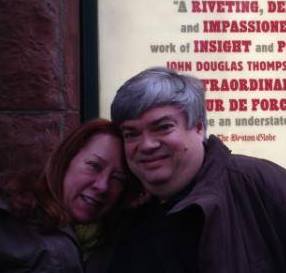“If anyone not a moron has determined to kill your husband, he will be killed. Nothing is simpler than to kill a man; the difficulties arise in attempting to avoid the consequences.”
Rex Stout, Too Many Cooks
Terry Teachout on the arts in New York City
“If anyone not a moron has determined to kill your husband, he will be killed. Nothing is simpler than to kill a man; the difficulties arise in attempting to avoid the consequences.”
Rex Stout, Too Many Cooks

A Terry Teachout Reader, my self-anthology, came out sixteen years ago. I’ve published hundreds of pieces on various subjects since then, and I have no plans to put together a sequel to the Teachout Reader, so I’ve launched a series of occasional posts drawn from my fugitive essays, articles, and reviews. I hope you like this one, which came from a 2004 review of Bright Young Things, the film version of Evelyn Waugh’s Vile Bodies.
* * *
Like so many other novelists of his generation, Waugh was keenly interested in how films “make things happen” on the screen by showing “actions and incidents” instead of allowing characters to explain their motivations at length. In Vile Bodies he translated this essentially visual approach into words on paper, depicting London in the Twenties in a tumbling rush of fragmentary scenes and spare, elliptical dialogue that suggests far more than it states. Nothing could have been so self-consciously modern. Yet the uproariously funny Vile Bodies turns out to be the darkest of “comic” novels, one whose inhabitants are all hurtling gaily toward their doom. It’s anything but surprising to learn that Waugh’s first wife left him while he was writing Vile Bodies, or that he converted to Catholicism eight months after it was published. Every page is scented with the anguish of a disillusioned young man searching for meaning in a world gone grossly wrong.
“They are the greatest living masters of the subtlest and kindliest of the arts.”
Rex Stout, Too Many Cooks

Lenny Bruce appears on The Tonight Show. This episode, which was portrayed on The Marvelous Mrs. Maisel, was originally telecast by NBC on April 5, 1959:
(This is the latest in a series of arts- and history-related videos that appear in this space each Monday, Wednesday, and Friday)
“The more one suffers, the more, I believe, has one a sense for the comic. It is only by the deepest suffering that one acquires true authority in the use of the comic, an authority which by one word transforms as by magic the reasonable creature one calls man into a caricature.”
Søren Kierkegaard, Stages on Life’s Way

From 2006:
Read the whole thing here.One of my mother’s most treasured heirlooms is a copy of the second edition of Our Baby’s First Seven Years, the “baby book” in which she set down the particulars of my early childhood. I flipped through its yellowed pages yesterday, and as I set out on the longish three-leg trip (two hours by land, two at the airport in St. Louis, three in the sky) from Smalltown, U.S.A., back to New York City, it occurs to me that you might be amused by some of what I found there….
“There is nothing fine about being a child: it is fine, when we are old, to look back to when we were children.”
Cesare Pavese, This Business of Living

I long ago lost count of the number of times that Satchmo at the Waldorf, my one-man-three-character play about Louis Armstrong, has been produced. I do, however, take note whenever I hear of an upcoming staging, and it so happens that there are two in the works, both of which will be streamed.
The first one, performed by Douglas Scott Streater and directed by Sharon Graci, will be mounted by PURE Theatre, a company based in Charleston, South Carolina, starting on December 17 and running through January. The second one will be produced by American Stage Theater of St. Petersburg, Florida, starting in February. (No other details have been released.) I know nothing about either of these theater companies, and neither one has reached out to me about producing Satchmo. That surprises my friends, and it used to surprise me until I realized that my first play is like a grown child who has gone out into the world to make his own way. All you have to do to produce it is get in touch with my publisher and apply for the rights to stage the show. I have nothing to do with it—I just sit back and, in due course, collect the royalties.I do, however, plan to watch both new versions on my laptop. So far as I know, Satchmo has never been webcast, and I’ve yet to see a production with which I wasn’t directly involved in one way or another. I’m very curious to see what actors and directors who don’t know me will make of my play. It’s an extremely demanding role, and the last Satchmo I saw, in Houston in 2019, was a production I directed myself, so it stands to reason that I have strong opinions about how to do it. On the other hand, I’m completely open to new approaches—I’ve seen Satchmo directed by three other people, and I liked all three versions—and I expect to learn new things about my play when I see it done by Pure Theatre and American Stage Theater.

It is strange to think that Satchmo is nearly ten years old. It never occurred to me when I staged the first workshop performance of the first half of the play at Florida’s Rollins College on February 1, 2011, that Satchmo would go on to be produced off Broadway and throughout America (though not yet in Kansas City or St. Louis, which makes me sad—I would dearly love to see it done in my home state). Nor did I suspect that making theater would become so important a part of my middle age, much less that I would make my debut as a professional stage director at the age of sixty.
I wish my mother had seen Satchmo, but she was no longer capable of traveling by the time it came to the stage. Fortunately, Hilary saw it many times, and it made her proud to know that her life’s companion had taken such a bold step forward. She was responsible for it, after all, though she never admitted as much: it was Hilary who insisted that I could do more than merely review plays, and it delighted her that she was right. Would that we could watch PURE Theatre’s Satchmo together next month! Alas, it cannot be, but I do plan when the show is over to lift a glass and say, with the fullest of hearts, “You did this, my beloved. Thanks.”
| M | T | W | T | F | S | S |
|---|---|---|---|---|---|---|
| 1 | 2 | 3 | 4 | 5 | 6 | |
| 7 | 8 | 9 | 10 | 11 | 12 | 13 |
| 14 | 15 | 16 | 17 | 18 | 19 | 20 |
| 21 | 22 | 23 | 24 | 25 | 26 | 27 |
| 28 | 29 | 30 | ||||
An ArtsJournal Blog